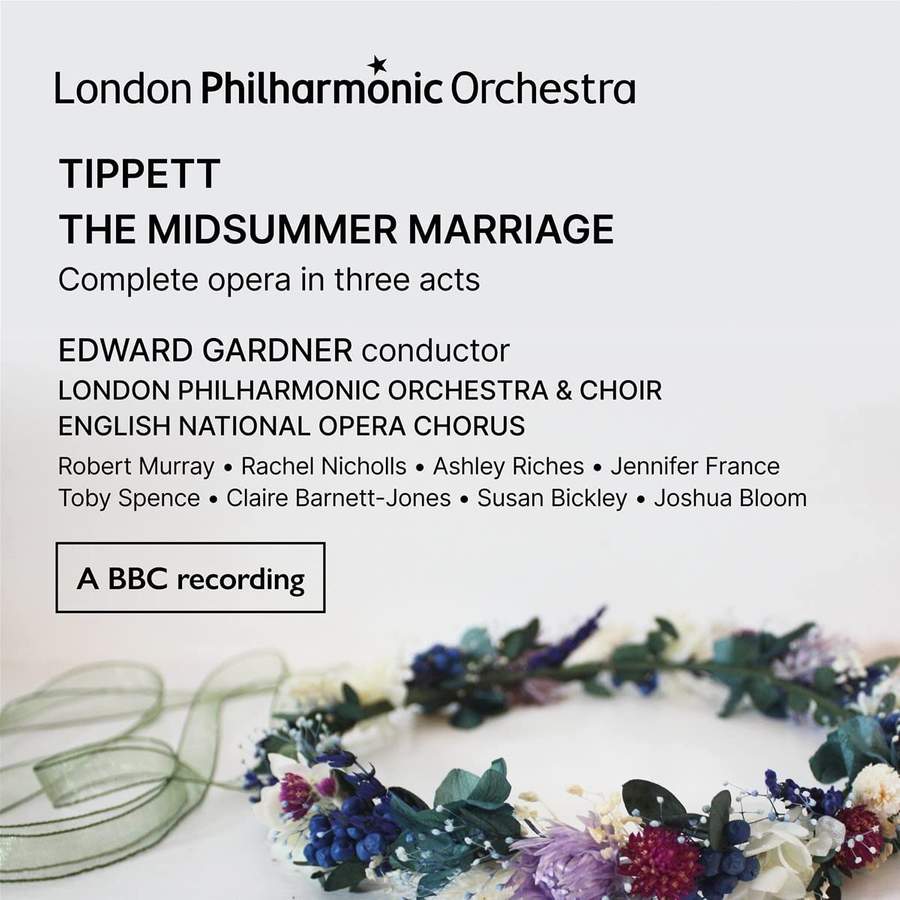TIPPETT The Midsummer Marriage (Gardner)
View record and artist detailsRecord and Artist Details
Genre:
Opera
Label: LPO
Magazine Review Date: AW22
Media Format: CD or Download
Media Runtime: 158
Mastering:
DDD
Catalogue Number: LPO0124

Tracks:
| Composition | Artist Credit |
|---|---|
| (The) Midsummer Marriage |
Michael Tippett, Composer
Ashley Riches, King Fisher, Bass-baritone Claire Barnett-Jones, Sosostris, Mezzo soprano Edward Gardner, Conductor English National Opera Chorus Jennifer France, Bella, Soprano Joshua Bloom, He-Ancient, Bass London Philharmonic Choir London Philharmonic Orchestra Rachel Nicholls, Jenifer, Soprano Robert Murray, Mark, Tenor Susan Bickley, She-Ancient, Mezzo soprano Toby Spence, Jack, Tenor |
Author: Mike Ashman
It is quite something to begin your principal conductorship of a major London orchestra with a work that is (a) an opera, and (b) a controversial one from the 1950s in English that’s not even in the regular repertoire. Edward Gardner tells us in a rallying booklet note that ‘pieces such as The Midsummer Marriage represent the greatest artistic fusion we know’, and suggests listeners ‘leave your librettos and guides to Jung at home and experience the shimmer of light in the woodwinds above the landscape at the beginning of Act 2, promising us the joy of a midsummer’s day’.
Every time Tippett’s first mature opera comes around – and it is more than 50 years since the first commercial recording under Colin Davis (now on Lyrita) – we have to disentangle the real from the mythical concerning the work’s 1955 Covent Garden premiere. This may have occasioned bad-mouthing from some nervous soloists puzzled by the libretto. But it was in fact a strong performance (to be heard easily now online and on several ‘private’ labels), whose music at least was received promisingly by critics.
This new performance is astutely cast from a cream of young British talent. One of its brightest lights, Rachel Nicholls’s Jenifer, is supreme in those testing moments that sometimes seem to require a coloratura Brünnhilde – a nigh-impossible-sounding job description that almost fitted an alternative career-choosing Joan Sutherland, who (with some struggle) created the role at the premiere. Nicholls has of course gone the other way – from earlier music to Wagner. She’s more than ably partnered here by Robert Murray’s impetuous and commanding Mark and the opera’s ‘common people’ couple – its Papageno/Papagena – who have in Tippett’s vision become a labourer and a secretary, Toby Spence (Jack) and Jennifer France (Bella). They’re both bright and sparky without guying their vocal lines with music-hall accents. Ashley Riches is a more reasoning, less dark King Fisher than we have sometimes heard and Claire Barnett-Jones clear as a bell as a Sosostris especially strong with text.
Gardner, for his own doubtless good instincts as to musical and dramatic pacing, has chosen to follow some minor cuts apparently authorised by the composer in 1968. These occur especially in Act 3 around the Sosostris/King Fisher encounter. If your curiosity is whetted by what you hear here (and I think it should be), the original – which gives greater weight to the scene and includes Jack’s rebellion – is a compelling listen.
Periodic rehearings of the work also help one get further to grips with its apparently eccentric structure. Hear how much of a ‘Grand Opera’ this is: how much Tippett, theoretically inexperienced as he was, sought to cater for all aspects of the Covent Garden company, the ballet and the chorus far from excluded. Indeed, the four colourful and noisily dramatic Ritual Dances genuinely have attained some separate concert life of their own – the only part of the opera that has. (And, amusingly enough, how the fabled aristocratic Paris audience of the 19th century, if they could have coped with the music, would have loved all the dance – almost! – being in Act 2.) And the chorus, their top notes ringing out with a Beethovenian challenge, have an out-of-the-ordinary-size role to sing and do, genuinely involved with the drama rather than just standing by. As Act 1 reaches its climax and Mark and Jenifer have exchanged upward and downward journeys (a kind of heaven and hell), the complex ensemble becomes even more exciting – as does this performance – and English lyric theatre walks tall, truly inventing for the first time its very own Grand Opera.
To assemble all this for a concert, with its inevitable limited rehearsal schedule compared to the stage, is not the least of Edward Gardner’s fluent achievements here. That special fire, and its cunningly chosen cast, sets this new release above the hard-worked Colin Davis set, which has been invaluable in the intervening years since its late-1960s origin. Gardner’s is more than warmly recommended as both reminder of and entrée to Tippett’s achievement. But don’t forget 1955.
Discover the world's largest classical music catalogue with Presto Music.

Gramophone Digital Club
- Digital Edition
- Digital Archive
- Reviews Database
- Full website access
From £8.75 / month
Subscribe
Gramophone Full Club
- Print Edition
- Digital Edition
- Digital Archive
- Reviews Database
- Full website access
From £11.00 / month
Subscribe
If you are a library, university or other organisation that would be interested in an institutional subscription to Gramophone please click here for further information.




